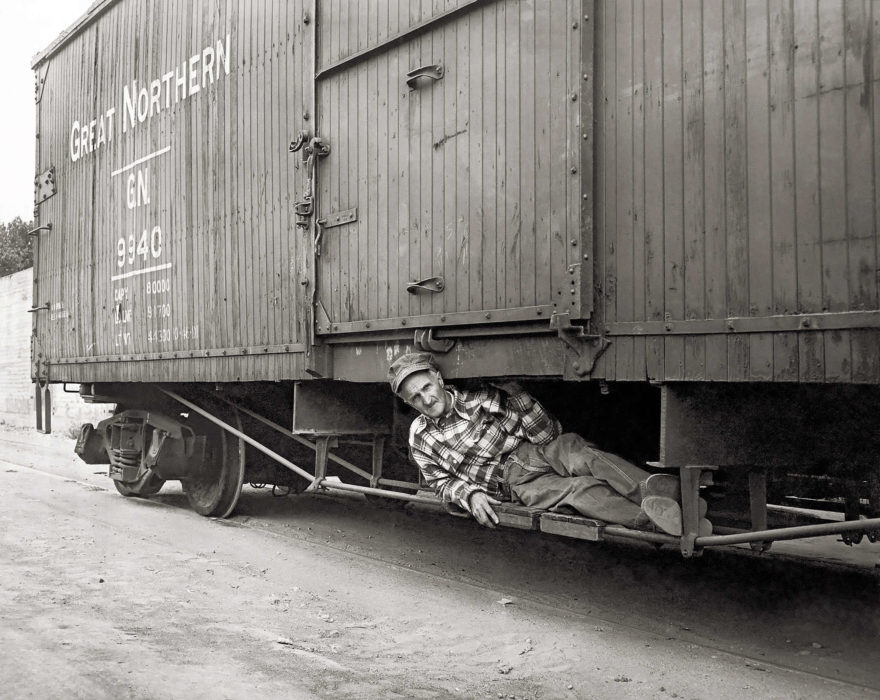THE TRACKS WHIZZED BENEATH him, just a few inches from his face, as he clung desperately to the iron rods on the underside of the railcar, amidst the relentless vibrations and unbearable sound. He had made the 750-mile journey from Minneapolis to Cleveland, and was now stealing away on the Nickel Plate Railway bound for Buffalo.
It was no way to travel. Hundreds died each year riding the rails. Hundreds more lost arms or legs. Then there were the thugs hired by railroads to beat the non-paying riders. At midnight Fred Mortensen raced across the tracks in Buffalo and jumped a train bound for Boston. It didn’t help that he had a bad leg, acquired while trying to rob a railroad mail car eight years earlier.
Fred Mortensen was just twenty-five, but had already seen much of life. Raised in the slums of Minneapolis, he was working the streets by the age of ten, robbing local shops to help feed the family after his father walked out. He and his brothers joined a gang and spent their days drinking, brawling, and terrorizing the community. “I violated any law I saw fit, man’s or God’s,” Fred later recalled. He was seventeen when they decided to rob the train. Things went awry. Police descended; bullets flew; Fred leapt off a rail bridge thirty-five feet high and shattered his leg.
Fred’s defense lawyer was Albert Hall, who had a track record of helping the poor. Hall was also a Bahá’í. He spent hours talking to Fred in prison. “Honestly, I often wondered then what Mr. Hall meant when he talked so much about love,” Fred wrote years later. “God’s love, Bahá’u’lláh’s love, ‘Abdu’l-Bahá’s love . . . I was bewildered.” Then one night Fred grabbed a guard by the neck, strangled him unconscious, and made his escape. He spent the next four years on the run.
During his time as a fugitive, Fred rediscovered some books Albert had given him. He became engrossed in the words of Bahá’u’lláh and ‘Abdu’l-Bahá. Eventually, Fred returned to Minneapolis and sought out Albert Hall. Hall didn’t turn Fred in, and the authorities seemed to have forgotten about him.
That’s how Fred found himself on top of a passenger train on the final leg of an adventure to meet ‘Abdu’l-Bahá. He hopped off at Portsmouth, New Hampshire, took a boat ride across the river to Kittery, then rode the streetcar to Green Acre.
“There I was at the Gate of Paradise,” Fred later wrote. But after his grimy voyage he looked like something out of the gutter. He cleaned up as best he could, rose the next morning at 6 a.m., and headed to the Inn to add his name to a very long list of visitors waiting to meet ‘Abdu’l-Bahá. Fred’s was the second name called. “Why, I nearly wilted,” he wrote.
‘Abdu’l-Bahá welcomed Fred with a smile and a warm handclasp. ‘Abdu’l-Bahá asked him if he had a pleasant journey. “Of all the questions I wished to avoid this was the one!” Fred recalled. Then ‘Abdu’l-Bahá asked again. “I lifted my eyes to his and his were as two black, sparkling jewels, which seemed to look into my very depth. I knew he knew. . .”

“I did not come as people generally do, who come to see you,” Fred told ‘Abdu’l-Bahá.
“How did you come?”
“Riding under and on top of the railway trains.”
“Explain how.”
“Now,” Fred wrote years later, “as I looked into the eyes of ‘Abdu’l-Bahá, I saw they had changed and a wondrous light seemed to pour out. It was the light of love and I felt relieved and very much happier. I explained to him how I rode on the trains. After which he kissed both my cheeks, gave me much fruit, and kissed the dirty hat I wore.”
The next day, as ‘Abdu’l-Bahá was about to leave Green Acre for Malden, Massachusetts, Fred waited among the crowd waving goodbye. Then, “to my astonishment he ordered me to get into the automobile with him,” Fred wrote. Fred was ‘Abdu’l-Bahá’s guest for an entire week.
Fred’s life changed. He moved to Atlanta, hoping to combat the racial injustices there by spreading Bahá’u’lláh’s teachings of unity and equality. He raised four children and campaigned for the labor movement, fighting for age limitations, the minimum wage, and safer working conditions.
Fred Mortensen died on June 13, 1946. At Fred’s funeral his family read, at his request, the account of the time he spent with ‘Abdu’l-Bahá.






